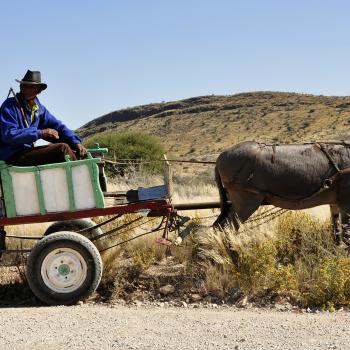It’s Sunday again. Before they begin eating breakfast, Clark reads Psalm 23 aloud to Marty and Missie—the Lord is my shepherd. Marty finds herself puzzling on this passage, trying to understand it. She wants to ask Clark what it means, but can’t seem to bring herself to do so.
Could this God Clark was reading about be a comfort to others as He had been to the writer?—David, Clark said his name was. Marty acknowledged that she knew very little about God, and sometimes she caught herself yearning to know more. Bible reading hadn’t been part of her upbringing. She wondered in a vague way if she had missed out on something rather important.
I’m divided on this. On the one hand, I find it hard to believe that Marty wouldn’t be familiar with figures like David. The eighteenth century U.S. (or Canada, if that’s where we are) was rather, well, Christian. On the other hand, though, it’s theoretically possible she could have grown up in a family that wasn’t particularly observant.
During the morning prayer time, Marty found herself wondering if she dared to approach Clark’s God in the direct way that Clark himself did. She felt a longing to do so, but she held back.
I don’t find Marty’s religious journey particularly interesting, and it’s not just because I’m not religious. There doesn’t seem to be any actual barrier to Marty becoming more religious. She’s not particularly anti-religious. She already believes in the Christian God; she doesn’t feel resentment toward him over Clem’s death; she doesn’t believe religion is silly or a kill-joy.
The only thing that seems to be in the way of Marty becoming as religious as Clark is is her reticence to talk to Clark about, well, anything.
Anyway, this chapter is actually about Marty trying to figure out how to fill yet another day. It’s Sunday, see, and as Clark concludes the Bible reading and they begin eating, Marty’s worry kicks into overdrive.
What on earth are we gonna do with this long day in front of us? Marty wondered silently. She knew that on this Lord’s Day she should not sew. She had made that blunder once, but to repeat it would be tempting God’s anger to fall upon her, and she couldn’t risk that. If He could spare any help at all for her, she desperately needed it.
This worry about sewing on Sunday is never resolved, by the way. Since it comes from Marty, and Marty is an unreliable narrator on religious matters at this point, its foundation seems shaky at best. But we never get to a point where Clark says “it’s ok, Marty, you can do things you find enjoyable and restful on the Lord’s Day, even if they’re technically considered work.”
Leaving things unresolved in this manner makes Oke feel remarkably un-preachy at times. If she’s trying to make a theological point in areas like this, she’s not doing it well enough.
Clark interrupted her thoughts. “On the way to town yesterday, I stopped me at the Grahams’ to see if there be anythin’ thet I might be gettin’ them in town. Ma asked thet we come for a visit an’ dinner today. Who knows how many nice Sundays we be a havin’ afore winter sets in? I said I’d check with ya on it.”
He couldn’t have mentioned this to Marty when he actually got home the evening before? Or over supper? He makes her wait until they’re eating breakfast before mentioning it?
Marty is, of course, thrilled. She can’t wait to go to the Grahams and hang out with Ma. Laura and Sally Anne? Pfft! They’re children! No, Marty would far rather hang out with someone she literally calls Ma. (What even is Ma Graham’s actual name?)
I agree with those commenters who have speculated that Oke has forgotten how old Marty is supposed to be. She made Marty 19 because it’s old timey and old timey women married young (never mind that in the 1860s the mean age at first marriage for women was actually 23), but she writes as though Marty is actually in her mid-twenties, not a young girl (interestingly, the actress who played Marty in the 2003 movie adaption of the book was herself in her mid-twenties.)

Anyway! It’s off to the Grahams we go!
She brushed out Missie’s curls until they were light and fluffy. The child truly did look a picture as she twirled and pirouetted, admiring herself and clapping her little hands with excitement.
There is an awful lot of emphasis on looks in this book. An awful lot.
So, the Grahams.
Young Jason Stern put in an appearance, much to the blushing of Sally Anne. The two went for a walk, always staying properly in full sight of the house.
Wouldn’t want the tongues to wag!
The two women made quick work of the dishes, and then Ma and Marty sat down for a chat. It felt so good just to sit and talk with Ma. Marty didn’t mind the unusual idleness half so much with such pleasant company. After discussing general women’s topics, Marty took advantage of the fact that the rest were outdoors and the two young ones down for a nap to raise a question.
General women’s topics? General women’s topics? What are those? I want to know! Did they discuss periods? Tampons??
Yes, silly, I know they didn’t have tampons back then. But does Oke know that??
Marty asks Ma to tell her about Ellen. And in case you’re wondering, yes, Marty does literally does call Ma Graham Ma. But I suddenly have another question. Who were Ellen’s friends, when she was alive? She seems to have been in the area for a while. Did she have any girlfriends? There’s a town nearby, and there seem to be plenty of other settlers within riding distance, including some married women younger than Ma (we’ll meet them later). Who did Ellen confide in? Who was she intimate with?
Anyway, here’s what Ma tells Marty:
“Ellen was young an’ right pretty, too. Darker than you, she be, an’ taller, too. She was a merry and chattery sort. Loved everythin’ an’ everybody, seemed to me. She adored Clark, an’ he ‘peared to think her somethin’ pretty special, too. … When Missie was born, ya should have see’d the two of ’em. … Never see’d two people so excited—like a couple of kids, they were.”
Clearly, Ma was not one of Ellen’s besties. Ma talks about Ellen as though she’s talking about a child. Clearly, they weren’t intimate friends. In fact, it sounds like Ma has been more intimate with Marty than she ever was with Ellen, despite Marty being younger than Ellen was.
I suspect Ma is opening up like this to Marty, taking her under her wing so to speak, because Ma sees herself when she looks at Marty. Ma, too, married a man who had lost his wife, after losing her own husband, and that marriage, too, had been about ensuring that children would be cared for.
Anyway, back to Ma:
“Clark’s a hard worker, an’ thet’s what farmin’ is all about. Ya git what yer willin’ to pay fer in sweat an’ achin’ back.”
Unless there’s a flood. Or grasshoppers. Or a drought. I’ve read the Little House books. It’s not all peaches and watermelon. Also, where are Clark’s farmhands?
“Well, things was goin’ real good when one day last August Clark came ridin’ into the yard. He was real agitated like, an’ I knew thet somethin’ was wrong. ‘Ma,’ he says, ‘can ya come quick? Ellen is in awful pain.’ Thet’s what he says. I can hear him yet.
“So I went, yellin’ to the girls what to do while I be gone.”
Somehow, on my last reread, I missed how tight the timeline is. Ellen died in August. Marty arrived in October. That’s only two months. Clark’s own grief is still that raw.
“Ellen was in pain, all right, tossing an’ rollin’ on the bed, hold-in’ herself an’ groaning’. She refused to cry out ’cause she didn’t want Missie to hear her. So she jest bit her lip till she near had it a bleedin’.
“Washing much thet I could do but try to keep her face cooled. There was no doctor to go fer, an’ we jest watched, in such pain ourselves over the fact thet we couldn’t be doin’ any-thin’ fer her. Clark was torn between stayin’ with Ellen an’ carin’ fer Missie. I never been so sorry for a man.”
In retrospect, she should have brought either Sally Anne or Laura to watch Missie, but then she was probably in such a hurry at seeing Clark’s desperation that she didn’t even think of that.
“Well, the night dragged by, an’ finally ’bout four in the mornin’ she stopped thrashin’ so. I breathed a prayer of relieve, but it wasn’t to be fer long. She kept gettin’ hotter an’ more an’ more listless. I bathed her in cool water over an’ over again, but it were no use.
Ma stopped for a moment, then took a deep breath and went on. “Thet evening’ we lost her, an’ Clark—” She stopped again.
I’ve quoted this bit in its entirety for a reason. Namely, to make clear that Ma never explicitly states what Ellen died of.
Earlier, when discussing how excited Clark and Ellen were on Missie’s birth—“like a couple of kids, they were”—Ma told Marty that she delivered Missie, as she did “most babies here ’bouts.” Given this and the timing—Missie would have been about 21 months when Ellen died—I was inclined to think Ellen died of a miscarriage, or in childbirth. However, if Ma was known as a midwife and there was no doctor, people probably turned to her for other ailments—and Ma never says anything about Ellen bleeding, or about trying to turn a baby. Was Ellen pregnant? Or was this a freak illness?
I just did some quick googling, and learned, to my horror, that there are not one but two movie prequels to Love Comes Softly. These prequels are not based on books, and it is worth noting that even the movie adaptations that are based on books make some significant changes (such as aging Missie up to about eight). Still, in one of the movie prequels, Ellen dies—of scarlet fever.
Is this how scarlet fever manifested? Isn’t scarlet fever contagious? Did Clark or Missie catch it—or Ma and her kids? For that matter, where did Ellen catch it? Lightbulb! Maybe Ellen caught it in town, and that’s why Clark doesn’t take Marty or Missie with him when he goes to town! But I digress…
I don’t think it was scarlet fever, and here’s why—when Clark finds out that Marty is pregnant—remember, she’s currently hiding it—he freaks out and starts moving heaven and earth to bring a doctor to town. If Ellen died of disease—something Marty or Missie could theoretically contract at any time—Clark’s extreme terror of Marty dying in childbirth makes little sense.
I think we’re supposed to conclude, based on this story and Clark’s later panic, that Ellen died in childbirth. It’s just that Ma and Marty’s ability to discuss “general women’s topics,” for some inexplicable reason, does not translate into an ability to discuss childbirth.
Anyway, Ma isn’t done yet.
“Was awful hard fer him to do all his fall work while totin’ thet little one round on his back. I said I’d keep her on here, but I reckon Clark wanted her to know thet she be his an’ somethin’ special, not jest one of a brood. Besides, he never did want to be beholden to anybody. There was a childless couple in town who would have gladly took her, but Clark would have none of it. Said she needed her pa right then; that’s what Clark said.”
And yet Clark is going to send Missie off with Marty come spring, if Marty chooses to leave—which, by the way, she is currently planning to do—never to see her again. Because that makes total sense.
Marty is really moved by all this. She decides Clark had a harder time of it, having to sit and watch Ellen suffer. And she is suddenly glad Clem never had to face something like that.
And that’s the end of the chapter, all sudden like.
I have a Patreon! Please support my writing!















